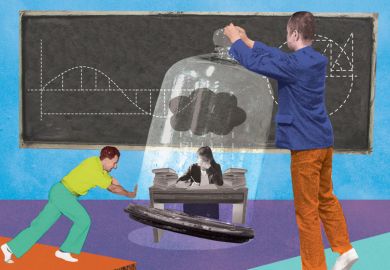Recently, I found myself in my doctor’s office with an ever-growing list of concerns. My doctor spent most of the consultations asking me questions while facing her laptop, typing out what I said.
Then one morning, I woke in excruciating pain and was unable to stand. When I called my doctor, the person who answered also typed notes of our conversation. A few hours later, a nurse telephoned to tell me that I’d been approved for a pain management clinic an hour from my home.
“But I told the last nurse I can’t walk. How will I get to that clinic?” I asked.
“Oh, that wasn’t logged in our system,” the nurse replied, before offering details of my previous calls – presumably to reassure me that they were on top of my case.
Such “patient relationship management systems” are not unlike the “student relationship management systems” that are a fast-growing phenomenon in US higher education. Both are versions of what is known as CRM: customer relationship management – a phrase that hints at their corporate origin. Even in 2014-15, 64 per cent of US universities were using CRM, while 42 per cent of the others were considering implementation, according to the American Association of Collegiate Registrars and Admission Officers.
CRM offers universities many advantages. It organises, centralises and provides real-time information about individual students across departments and through the student life cycle, including details on admissions, financial aid, physical and mental health, career advising, academics, student life and alumni engagement. It also allows for data-mining on persistent concerns, such as retention.
However, there are downsides. Centralised, sensitive information is susceptible to security threats, especially when the database is accessible to so many university employees and is stored by a third party. Implementation, annual training, technical support and upgrades are costly, which pushes up already high tuition fees. Implementation requires academics to view students as customers: a shift in culture that faculty often resist with good reason. Finally, faculty may genuinely lack time to log the detailed notes that CRM demands without its detracting from meaningful engagement with students.
“The use of (CRM),” a recent faculty communication from my university read, “which represents an important and necessary part of advising for our students, is essential if we are to give our students the degree of care they deserve.” It went on to note that faculty who do not use the system – to track email communications and to provide information about students’ academic progress and struggles gleaned from meetings and conversations – might be reported to the dean.
Had my doctor faced similar pressure to use her practice’s system? Doctors are notoriously busy, and my case was complicated; if she had not typed notes during my appointments, would she ever have found the time? But, with the “system” between us, she forfeited time to know me, as well as time to administer medical care. She also set conditions for me to see her as less than a doctor. When I phoned her practice in serious pain, I was not seeking bureaucratic evidence that they were “on” my case. I wanted someone to listen, think and help get me back on my feet. Ultimately, I had to go to an urgent care facility for that: a physician’s assistant looked at me throughout a lengthy conversation concerning my medical history and current problem and determined that I needed an operation.
I am proud that my university prioritises caring about students. However, just as CRM impeded my doctor’s ability to deliver quality care, it also impedes my ability to engage with and care for students. CRM may work well for admissions, billing, financial aid, transcript requests and other routine administrative needs of students. However, it diminishes the quality and kinds of experiences that students should expect to have with faculty.
I seek to be fully present with my students – to not stare at my laptop – when meeting with them to discuss course registration, offer academic support or address a personal concern. Most of my on-campus time is spent with students even when I am not teaching or tutoring. During this face time, they often share good and bad news: a new internship, a failed exam, a graduate school acceptance, a problem with course registration, kudos received from a challenging professor, or concern about a sick parent. I respond not by running to CRM but by providing assistance in a way that feels efficient, natural and – I hope – intelligent.
When I am concerned about a student’s mental health, I talk about the wellness centre’s services and offer to make an appointment. When a student is struggling academically, I offer help devising a broad plan for getting back on track. When a student has encountered an unexpected economic crisis, I share knowledge of ways in which the financial aid or other campus offices might help.
I have had time to think while waiting for the surgery that my leg requires. That recent faculty communication from my university should have read: “Attentive, intelligent thoughtfulness is an important and necessary part of advising our students. Faculty who fail to deliver will be reported to the dean.” Such a statement would have raised an inevitable question about how to document this quality; I do not have an answer, except to say that I recognise it when I see it.
However, I do know this. Patients, students and even young children are savvy enough to differentiate between doctors, teachers and parents who genuinely care and those just going through the motions. If someone engaged in an authentic relationship forgets a small detail, goodwill prevails. But an enforced protocol will never act as a satisfying substitute for honest concern.
Susan D’Agostino is associate professor of mathematics at Southern New Hampshire University.
POSTSCRIPT:
Print headline: Don’t record – just listen
Register to continue
Why register?
- Registration is free and only takes a moment
- Once registered, you can read 3 articles a month
- Sign up for our newsletter
Subscribe
Or subscribe for unlimited access to:
- Unlimited access to news, views, insights & reviews
- Digital editions
- Digital access to THE’s university and college rankings analysis
Already registered or a current subscriber?






